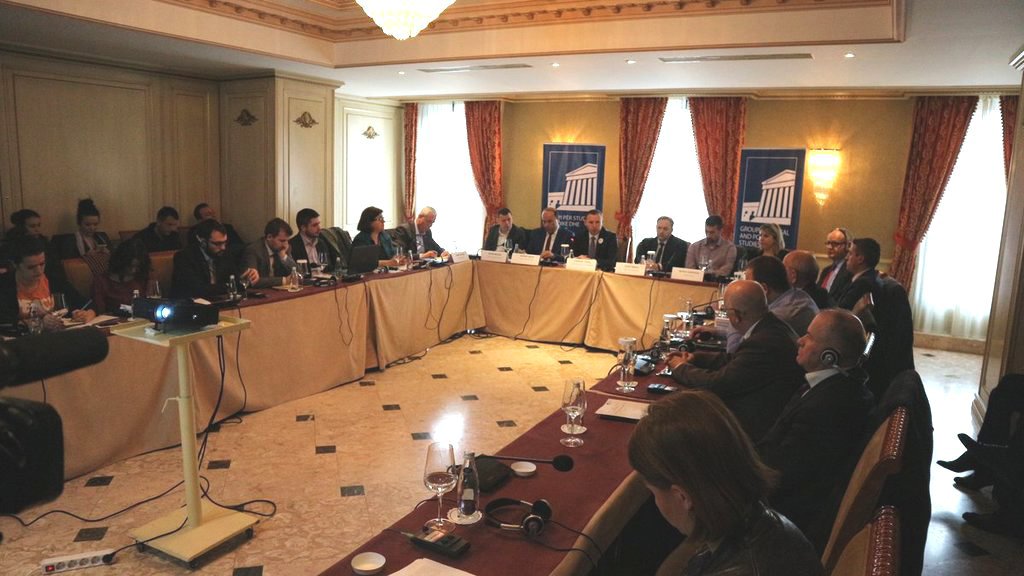On 10 March 2017, Group for Legal and Political Studies (GLPS) organized a Roundtable Discussion on the topic: “Challenges of the Justice System: Citizens’ dissatisfaction towards the performance of judges and prosecutors. Where does the problem stand?”, held in Prishtina. The aim of this event was to discuss the performance and the efficiency of the judiciary and prosecution in Kosovo. Moreover, the discussion served as an opportunity to analyze the identified challenges and difficulties of the work of judges and prosecutors, as well as citizens’ lack of satisfaction and trust towards the judicial system. At the beginning of the discussion, Group for Legal and Political Studies published the Second Edition of the Rule of Law Performance Index in Kosovo (hereinafter: RoLPIK), which serves as a tool to demonstrate the trend of performance, efficiency and independence of judiciary and prosecution. In addition, this Index assesses the perceived level of citizens’ satisfaction on the performance of rule of law institutions in Kosovo. It is of a great concern that the survey data shows that 24.8% of the respondents think that none of the rule of law institutions are able to perform tasks/responsibilities independently. This negative perception towards the independence of the judiciary and prosecution has increased compared to the data conducted in June 2016, where only 16.2% considered that these institutions aren’t independent. In addition, the survey data portrays that 58.2% of respondents think that people with political influence are less likely to receive proper punishment by the law. In terms of fight against corruption, the data reflects a negative citizens’ perception toward the rule of law institutions, in specific to the judiciary and prosecution. Whereas, regarding the bribery, the data shows that 43.4% of respondents believe that employees of the rule of law institution are directly involved in receiving bribes. Precisely, 77.9% of them perceive that the courts are the institution most affected by bribery, the prosecution followed by 69.4%, with 52.2% police and EULEX with 31.3%. In addition, only 4.7% and 3.6% perceive the judiciary and prosecution as competent institutions fighting corruption in Kosovo. In specific, 48.6% of citizens consider the Kosovo Police as the most active institution in effectively fighting corruption, followed by the media (19.1%) and the Anti-Corruption Agency (14.4%). Even in the case of reporting corruption, Police is the institution where citizens would most likely report corruption and crime cases, with 85.6%, in total. In conclusion, panelists highlighted that lack of professional staff and the low number of judges and prosecutors in comparison to the new cases received directly reflect in efficiency of these institutions in resolving cases timely. Furthermore, rule of law institutions lack transparency and accountability, which are crucial towards improving the justice system overall. This discussion gathered representatives from all relevant rule of law institutions, judiciary and prosecution on central and local level, international community, civil society and media.
Panelists:
Mr. Armend Zemaj – Member of the Parliamentary Committee on Legislation;
Mr. Agron Qalaj – Prosecutor at the State Prosecutor Office;
Mr. Idain Smaijli – Deputy Chair of the Kosovo Prosecutorial Council;
Mr. Sami Kurteshi – Vetëvendosje;
Mr. Betim Musliu – Kosovo Law Institute;
Mr. Arton Demhasaj – Çohu;
Ms. Albana Merja – Presenter of the report, GLPS.
Venue: Hotel Swiss Diamond, Marec Hall (Square Mother Theresa, 10000 Prishtina, Kosovo)
This project is financed by the project/program Democratic Society Promotion (DSP) – financed by the Swiss Cooperation Office in Kosovo (SCO-K) and managed by the Kosovo Civil Society Foundation (KCSF).
Share article
Latest Publications
April 8, 2024
Policy Analysis
Reflecting on the Third Year of Kurti II: Setbacks and Achievements in Rule of Law, Public Administr ...
March 22, 2024
Policy Analysis
Lost, “in the Twilight Zone” Rebutting the Court’s Blunder
March 7, 2024
Policy Analysis
Unfair Treatment? The EU’s facilitator role over the Kosovar or Serbian contempt of the Dialogue
Related Espresso Insights
March 4, 2024
Espresso.Insights
Passport Hangover: What’s next after Spain’s Kosovo breakthrough?

January 16, 2023
Espresso.Insights
Recognized but not supported: Hungary's stance on Kosovo's EU bid





